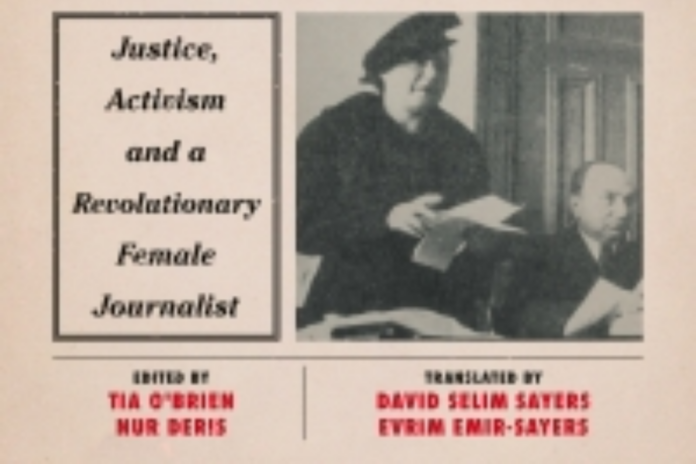“Papers are accused of saying things they didn’t. Their articles are misrepresented, distorted and denounced… These are the tactics of the status quo today, designed to confuse the common people…”
– Sabiha Sertel
December, 2019? No. December, 1945.
The tactic of using “fake news” smear attacks is not a recent phenomenon; it’s a longstanding strategy intended to intimidate journalists. My family has experienced this firsthand.
On December 4th, 1945, an hour of unforeseen warmth on a winter morning in Istanbul changed my family’s destiny and had a profound impact on the course of democracy in modern Turkey.
Authoritarian Regime Mobilizes Violent Mob to Silence Tan Newspaper
Imagine this scenario: Under the direction of the authoritarian regime, a ruthless mob numbering in the thousands, armed with pickaxes and sledgehammers, embarks on a mission to obliterate the country’s second-largest newspaper, Tan, and silence its influential editors, Zekeriya and Sabiha Sertel, permanently.
This brutal act was a desperate response to the Sertels’ unwavering advocacy for democracy and a free press, as they launched an aggressive campaign for multi-party rule, leveraging their popularity and publishing platform to directly challenge the regime.
Also Read: An Extract From DESERT LOCUST PLAGUES By Colin Everard
An American Journalist Reflects On Turkey’s Struggle For Press Freedom
As the grandson of esteemed journalists Zekeriya and Sabiha Sertel, I find myself struck by the enduring significance of the Tan riot, which many still consider the darkest chapter in Turkey’s pursuit of a free press, even 74 years later. This distinction troubles me, especially considering the current state of affairs where the government firmly controls the mainstream media.

According to the Committee to Protect Journalists, Turkey has held the dubious distinction of imprisoning more journalists than any other nation for three consecutive years, only relinquishing its top spot in 2019.
Equally astonishing is the narrative revealed in my grandmother’s memoir, which has recently become accessible through an English translation.
She emerged as the inaugural professional female journalist in modern Turkey, a fervent socialist who, alongside her husband, waged an unyielding battle to realize a complete democracy.
Echoes Of Tan’s Destruction In 21st-Century Global Press Suppression
In her autobiography, Sabiha paints a vivid picture of the notorious destruction of Tan. Her narrative carries a chilling resonance, drawing parallels with contemporary Turkey and events unfolding worldwide: the ascent of authoritarian rule and the subtle repression of the media in Western democracies, such as the United States and the United Kingdom.
Seven decades following the Tan riot, the legacy of the Sertels endures as a source of inspiration for a determined group of opposition journalists facing persecution in present-day Turkey.
They embody defiance and resilience, with many following in the footsteps of the Sertels. In their commitment to keeping the public informed, the Sertels braved censorship, termination of employment, imprisonment, and ultimately, were compelled into exile.
Prophetic Words From Sabiha Sertel: A Reflection On The Eve Of Tan’s Demise
On December 3rd, just prior to the destruction of Tan, Sabiha penned an article that holds haunting relevance in our current era of “fake news.”
“Opposition newspapers show great civil courage in speaking the truth,” she writes, describing a brazen campaign to distort and discredit critical journalists. “This is the clamor of the status quo, raised to drown out the people’s opposition.”
On that very day, a pro-government newspaper featured a front-page editorial titled “Awaken, Patriots!” serving as the rallying call for the attackers of Tan.
Further, On December 4th, Sabiha responded with her last article, titled “Don’t fear newspapers. Fear the people,” marking her defiant stance against censorship and suppression.
” … Publications only have an impact if they reflect the will of the people. If they oppose the ideas and interests of the people, they simply fade away. All the noise made by pro-government journalists to drown out opposition papers won’t be enough to fool or confuse the people. Don’t fear newspapers. Fear the people.”
Sabiha’s Eyewitness Account: The Unraveling Of Tan
In her memoir, Sabiha recounts the events of that fateful morning. At 9:30 am, a news editor, serving as an eyewitness, observes as a gathering of students rapidly escalates into a seething mob of thousands, coursing through cobblestone streets, chanting “Down with communists! Down with the Sertels!” until they converge upon the publishing house.
“Youth after youth surged forward, shattering Tan’s windows and doors with stones and iron bars,” he narrates. “Inside Tan’s premises, located on the first floor, was one of Turkey’s largest rotary printing presses of the era. They commenced their assault on this press, wielding the iron pieces they discovered within the room, causing irreparable damage by smashing it to pieces, even destroying the parts they had broken off.”
The government’s scheme suffered a single setback: the inability to carry out the public lynching of the Sertels, who had gone into hiding. Following the riot, they were detained, subjected to trial, and ultimately acquitted. Upon their return home, Don’t fear newspapers Fear the people, they discovered themselves under constant police surveillance, ostracized from society, and eventually compelled to flee their homeland.
Repeatedly throughout her memoir, my grandmother’s insightful words are an ominous warning.
1937: The Sertels’ Forewarning Of Hitler And Fascism
In 1937, the Sertels caution the Turkish populace about the escalating danger posed by Hitler and the rise of fascism. Sabiha recalls her interview with the French foreign minister during this time, particularly his reaction when asked about Hitler and the looming specter of war.
…The French Foreign Minister appeared calm and composed. He confidently expressed that concessions to Germany could avert war.
…As the German armies eventually launched their assault on France, I couldn’t shake the memory of that minister. It seemed as though he had buried his head in the sand like an ostrich, yet left his feet exposed. Then, in a cruel twist, the fascist forces seized hold of that ostrich by its legs and stripped it of its feathers.
Reflections On The Rise Of Nationalism: A Concern For The Future
As nationalism gains momentum in both Europe and the United States, and authoritarian regimes tighten their grip, one cannot help but wonder how many people will suffer the same fate as those left vulnerable.
In 1950, the Sertels fled Turkey out of fear for their lives. So, Don’t fear newspapers. Fear the people. Despite losing everything, my grandparents remained resolute in their refusal to be silenced. Denied asylum by the United States, they found themselves behind the Iron Curtain at the peak of the Cold War. There, they entered into a remarkable agreement with the Soviets: establishing an underground radio station to clandestinely broadcast uncensored news back to Turkey.
When their agreement with the Soviets fell apart, they relocated again, this time to Baku. However, the Soviets revoked their Turkish passports and imposed restrictions on their movement, effectively confining them. Nevertheless, they persisted in their writing endeavors. Through their memoirs, they document an unwavering struggle for a Turkish democracy characterized by civil rights and a free press.
Legacy Of Determination: Sabiha Sertel’s Lasting Impact
Sabiha passed away in exile shortly after finishing her autobiography, which she aptly titled Like a Novel. Upon learning of her terminal cancer diagnosis, her response was poignant: “What a shame, I still have so much more to write.”
They clandestinely transported the manuscript out of the Soviet Union, concealing it within a suitcase filled with soiled laundry. Its content stirred controversy, given Sabiha’s exile and vilification as a purportedly dangerous, outlawed communist, perceived as a threat to the Republic Don’t fear newspapers. Fear the people.
Growing up in suburban Washington, D.C., my grandmother remained an enigma to me. I had met her only once at the age of three, and lacking proficiency in Turkish, I remained oblivious to the contents of her book. It was only when I embarked on the journey to translate it that I sought to uncover the truth about the elusive Sabiha.
Inspiring Journalistic Duty: The Sertels’ Unwavering Commitment To Democracy
What I discovered was a clarion call for journalists not only in Turkey but also in nations where the privilege of a free press is often taken for granted. Despite enduring the loss of their publishing empire, their fortune, their homeland, and even their family, my grandparents steadfastly clung to the conviction that an informed electorate remained democracy’s strongest ally.
In a letter penned months after Sabiha’s passing, my grandfather left no room for doubt regarding their unwavering commitment. He inquired whether I had perused their autobiographies, affirming, “We labored and we battled for our vision of democracy and for our populace. That is our solace.”
Silencing Opposition In The Digital Era: The Ease Of Censorship In Turkey
In today’s digital age, orchestrating large mobs to physically destroy influential opposition media outlets is no longer necessary. Instead, a mere flick of a switch to cut off power, followed by a takeover, suffices to silence dissenting voices. This pattern of censorship repeats itself all too frequently in Turkey.
Sabiha’s memoir continues to resonate, demonstrating that courageous journalists who boldly speak the truth cannot be easily silenced or erased from memory. I was astonished when both the English and republished Turkish editions unexpectedly sold out. What is it about her story that continues to captivate readers even decades after her passing?
Encounter With Living History: The Significance Of The Sertels’ Legacy
During a flashback on the 65th anniversary of Tan’s destruction, I find myself dining at a Turkish restaurant nestled in a Philadelphia strip mall. Nearby, members of the Philadelphia Turkish Society catch wind that I am the granddaughter of the Sertels.
A retired accountant in his seventies joins me, reminiscing about the oppressive atmosphere surrounding the mere mention of the Sertels’ names during his student days in the 1950s and 1960s. As I prepare to depart, he stops me, expressing disbelief at being in the presence of Sabiha and Zekeriya’s granddaughter. He underscores the profound importance of preserving their remarkable legacy.
My grandparents’ enduring legacy transcends generations, Don’t fear newspapers. Fear the people, as they grasped the peril of history’s recurring patterns and foresaw their repercussions. Sabiha penned her memoir in a cramped, dismal apartment in Baku, starkly contrasting to the Sertels’ legendary villa overlooking the Sea of Marmara.
Despite enduring 18 years of exile with no prospect of returning home to Turkey, the narrative she crafted brims with unwavering hope for a brighter nation and world, culminating in a powerful message: never surrender.
Also Read: An Accessible America In The Balkans


